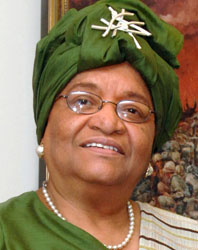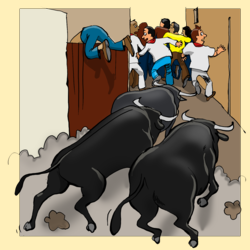 The current president of Liberia’s autobiography is entitled This Child Will Be Great: Memoir of a Remarkable Life by Africa’s First Woman President. With a title like that, the reader cannot expect a tome replete with self-deprecating humility, but in amongst the politician’s appreciation of her own achievements there is plenty for the reader to appreciate as well. Ellen Johnson Sirleaf is an outstanding leader and a truly remarkable person.
The current president of Liberia’s autobiography is entitled This Child Will Be Great: Memoir of a Remarkable Life by Africa’s First Woman President. With a title like that, the reader cannot expect a tome replete with self-deprecating humility, but in amongst the politician’s appreciation of her own achievements there is plenty for the reader to appreciate as well. Ellen Johnson Sirleaf is an outstanding leader and a truly remarkable person.
Liberia was colonised in the 19th century by emancipated American slaves, the descendants of whom formed a powerful political elite in a country culturally divided between Americo-Liberians and native Liberians. The author, despite being of native Liberian heritage, managed to work her way up to the position of finance minister in the government before tensions arising from political and economic inequalities erupted into a bloody military coup in 1980, followed by a downward spiral of corruption and violence and then many years of savage civil war.
Time and again Ellen Johnson Sirleaf showed astounding courage in confronting injustice and oppression, first standing up to the president and demanding better conditions for the poor in the days of the Americo-Liberian government, then standing up to the brutal military dictator President Doe and expressing her opinions freely notwithstanding the imminent risk to her life. After many years in exile working for the World Bank and Citibank, the author returned to Liberia to run for president and surprised the experts by winning. The book is very interesting to read and contains many useful leadership lessons.
 This is the final post in a weekly series discussing themes from Gregory Clark’s book
This is the final post in a weekly series discussing themes from Gregory Clark’s book  Just as we invest 2% to 3% of our GDP in technological research and development, we should be putting say 1% of our GDP into social innovation, according to Geoff Mulgan, former director of policy for Tony Blair’s government,
Just as we invest 2% to 3% of our GDP in technological research and development, we should be putting say 1% of our GDP into social innovation, according to Geoff Mulgan, former director of policy for Tony Blair’s government,  A team of up to 14 men from Britain’s SAS has for the past six months been providing training to Libyan special forces in “counter-terrorism” techniques including covert surveillance,
A team of up to 14 men from Britain’s SAS has for the past six months been providing training to Libyan special forces in “counter-terrorism” techniques including covert surveillance, 
 Why were there so many volunteers when, as described in
Why were there so many volunteers when, as described in  Culture is what human beings make of the world, and the only way to change culture is to create new culture, according to Andy Crouch in his book
Culture is what human beings make of the world, and the only way to change culture is to create new culture, according to Andy Crouch in his book  This post continues the weekly series discussing themes from Gregory Clark’s book
This post continues the weekly series discussing themes from Gregory Clark’s book  In a
In a  The
The